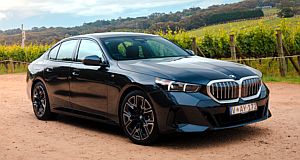
BEV Market: BMW’s Confidence Amidst Shifting Sentiments
Recent reports from international business papers paint a gloomy picture for the battery electric vehicle (BEV) market. Despite an initial surge in demand, market sentiment seems to be losing its shine, with signs of slowing sales growth and even Teslas being left parked on the grass.
Factors such as supply constraints, which once bolstered demand during the ‘Carmageddon’ era, now appear to have eased. Evidence of this can be seen in Hyundai’s decision to slash prices by up to $12,000 on its 2023 Ioniq 6 models to make way for the 2024 range.
However, BMW Group Australia holds a different perspective. Far from slowing down, BMW is doubling down on its commitment to BEVs. With the introduction of the i5, BMW’s local lineup now boasts 12 pure-electric models, with plans for three more, including the iX2 small coupe-SUV, to hit Aussie showrooms by mid-2024, bringing the total to 15.
What’s significant is that six of these models fall below the $89,332 Luxury Car Tax threshold, making them eligible for Fringe Benefits Tax (FBT) savings—a factor likely to appeal to company car and novated lease drivers.
The launch of the G60 5 Series also signals a strategic shift, with more electric variants than combustion-powered ones—a move reflecting BMW’s anticipation of sustained demand for its expanding BEV portfolio.
Brendan Michel, BMW Australia’s head of product planning, remains optimistic about the future, citing a tripling of the national BEV market year-to-date. He also highlights government incentives and BMW’s pricing strategy aimed at achieving cost parity with combustion options as drivers of growth.
Despite the overall market seeing a slowdown in BEV sales growth compared to the previous year, Australia continues to experience a boom. BMW’s success in the BEV space, with 1869 units sold year-to-date (excluding plug-in hybrids), places it ahead of rivals like Polestar while trailing behind Mercedes-Benz.
In conclusion, while the global BEV market may be facing challenges, Australia’s ongoing appetite for electric vehicles presents opportunities for manufacturers and consumers alike.

